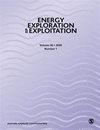可再生能源消费比例对美国和英国地缘政治风险的影响
IF 1.6
4区 工程技术
Q4 ENERGY & FUELS
引用次数: 0
摘要
可再生能源是传统化石燃料的有效替代品,可减少对从特定国家进口能源的依赖,从而减轻地缘政治风险,确保国家能源安全。可再生能源的开发和利用对全球能源消费结构和地缘政治格局有着深远的影响。本文利用 1990 年至 2020 年的时间序列和面板数据,研究了可再生能源消费与地缘政治风险之间的因果关系。主要以美国和英国为重点,建立了一个多变量回归模型进行实证分析,并与七国集团(G7)其他成员国进行了比较分析。随后进行了稳健性检验,以进一步验证模型的稳健性。此外,本研究还探讨了军事实力作为调节变量在可再生能源与地缘政治关系中的作用。最后,构建了一个向量自回归模型来分析可再生能源与相关变量之间的动态关系。研究结果表明:(1) 太阳能、风能和潮汐能等清洁可再生能源的消费显著降低了美国和英国的地缘政治风险,法国、加拿大和日本的实证结果有所不同,这要根据其发展背景来解释;(2) 美国和英国国防开支的增加显著增强了可再生能源消费对降低地缘政治风险的积极影响。利用可再生能源不仅能使国家能源选择多样化,还能减少对化石燃料的依赖,促进国际合作,从而缓解地缘政治紧张局势。这项研究丰富了有关全球主要国家可再生能源消费与国家能源安全之间关系的文献,为在新的世界发展模式下制定和实施国家能源发展战略提供了理论启示。本文章由计算机程序翻译,如有差异,请以英文原文为准。
The impact of the proportion of renewable energy consumption on geopolitical risks in the United States and the United Kingdom
Renewable energy serves as an effective alternative to traditional fossil fuels, reducing reliance on energy imports from specific countries, thereby alleviating geopolitical risks and ensuring national energy security. The development and utilization of renewable energy have profound implications for the global energy consumption structure and geopolitical landscape. This paper utilizes time-series and panel data from 1990 to 2020 to examine the causal relationship between renewable energy consumption and geopolitical risks. Focusing primarily on the United States and the United Kingdom, a multivariate regression model was developed for empirical analysis, with a comparative analysis conducted against other Group of Seven (G7) member countries. Subsequent robustness checks were performed to further validate the model's robustness. Additionally, this study explores the role of military strength as a moderating variable in the relationship between renewable energy and geopolitics. Lastly, a vector autoregression model was constructed to analyze the dynamic relationships between renewable energy and related variables. The findings reveal that (1) consumption of clean renewable energies, such as solar, wind, and tidal energy, significantly reduces geopolitical risks in the United States and the United Kingdom, with differing empirical results for France, Canada, and Japan, interpreted according to their developmental contexts and (2) increased defense expenditure in the US and the UK significantly enhances the positive impact of renewable energy consumption on mitigating geopolitical risks. Utilizing renewable energy not only diversifies national energy options but also reduces reliance on fossil fuels and fosters international cooperation, thereby easing geopolitical tensions. This research enriches the literature on the relationship between renewable energy consumption and national energy security in key global nations and offers theoretical insights for the formulation and implementation of national energy development strategies in the new world development paradigm.
求助全文
通过发布文献求助,成功后即可免费获取论文全文。
去求助
来源期刊

Energy Exploration & Exploitation
工程技术-能源与燃料
CiteScore
5.40
自引率
3.70%
发文量
78
审稿时长
3.9 months
期刊介绍:
Energy Exploration & Exploitation is a peer-reviewed, open access journal that provides up-to-date, informative reviews and original articles on important issues in the exploration, exploitation, use and economics of the world’s energy resources.
 求助内容:
求助内容: 应助结果提醒方式:
应助结果提醒方式:


